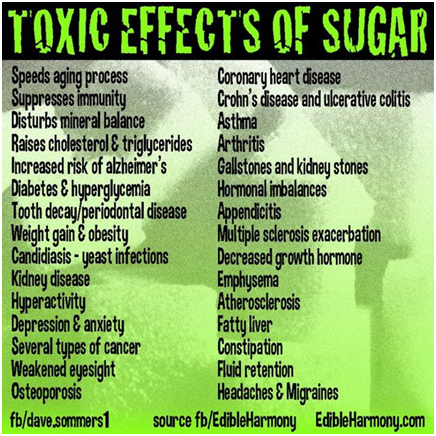Let’s not sugar-coat it: it takes a heap of persuading to get folks to change a longstanding habit. And eating habits are probably the hardest to change of all.
 Our medical practice has shown us that people love their sugar, and they really aren’t interested in thinking of it as a vice or a bad thing. After all, chocolate cake and ice cream bring up so many sweet memories.
Our medical practice has shown us that people love their sugar, and they really aren’t interested in thinking of it as a vice or a bad thing. After all, chocolate cake and ice cream bring up so many sweet memories.
“And you’re asking us to think of these sweet rewards as poisonous substances? Get real!”
Nevertheless, our experience as naturopathic physicians has shown us very clearly that if we want to stay healthy, energetic, and happy, it’s absolutely essential to understand how sugar affects our bodies.
Let’s start by considering the effects sugar has on our physiology and biochemistry. These detrimental effects don’t just impact a few rare, vulnerable individuals. They’re the inevitable fate of everyone who reaches for the sugar bowl a little too often.
- Sugar makes the body insulin-resistant, which leads inexorably to diabetes.
- Sugar promotes inflammation, which is associated with many serious health issues.
- Sugar promotes weight gain and obesity, which are implicated in a wide range of serious health risks.
- Sugar feeds cancer cells.
- Sugar causes “good” cholesterol (HDL) to drop and “bad” cholesterol (LDL) to rise.
- Sugar causes (non-alcoholic) fatty liver disease.
- Sugar reduces the body’s ability to absorb and process proteins and fats.
- Perhaps worst of all, sugar severely limits the immune system’s ability to protect us against harmful organisms.
Let’s take a closer look at these serious immune system effects.
The immune system isn’t a single organ; it’s composed of millions of tiny cells and larger organs that work together to ward off invasion by bacteria, fungi, viruses, and other pathogens. The immune system is huge – its components are found throughout the body.
When offending organisms invade, the immune system quickly responds by producing special white blood cells called phagocytes.
The phagocytes rush to the site of the invasion and envelop the offending organism, preventing it from spreading and effectively killing it. The very important phagocytes neutralize or destroy invading organisms until the body has time to flush them out of the system.
 Vitamin C energizes phagocytes. When the body sends the phagocytes to defend against viruses and bacteria, they require about 50 times more Vitamin C than normally.
Vitamin C energizes phagocytes. When the body sends the phagocytes to defend against viruses and bacteria, they require about 50 times more Vitamin C than normally.
Now then, sugar disrupts the body’s immune defenses by competing with vitamin C for space in the cells. To repeat: white blood cells need lots of Vitamin C to destroy bacteria and viruses. Yet the more sugar you consume, the less Vitamin C is available to help the white blood cells fight disease.
The result is greatly weakened immune defense against infections.
“The average person loses more than 90% of their immune function within 15 minutes of indulging in this poisonous substance [sugar]. This deficiency lasts for about 2 hours after the stress occurs.” – Dr. Walter Stoll
Sugar’s very damaging immune effects are supported by voluminous research. A 1973 study at Loma Linda University found that when you eat 100 grams of sugar (roughly equal to the sugar in a one-liter bottle of soda), your white blood cells are 40 percent less effective at killing germs.
This seemingly moderate sugar dose can cripple the immune system for up to FIVE HOURS!
Recent studies not only confirm this finding; they’ve shown that just one teaspoon of sugar may have a similar immune-incapacitating effect.
On the plus side, behavioral scientists tell us that it takes about eight weeks to establish a new habit. If you have a sugar problem, the information we’ll post over the next few months will help you break the sugar addiction. Also, we’ll present delicious suggestions for replacing white sugar with healthier alternatives.
For more on Dr. Marcel’s work click HERE.
